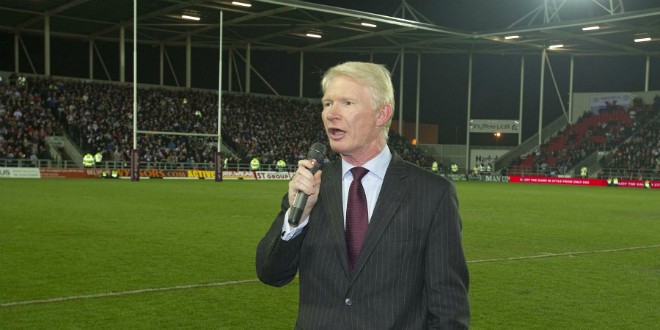
It was a huge week for British rugby league last week – perhaps for all the wrong reasons. With leading Super League clubs appearing to confirm the end of the Super 8s – only for other clubs and the RFL to deny that was the case – it was difficult to work out exactly what is going on. League Express senior writer Aaron Bower met with St Helens chairman Eamonn McManus to get to the bottom of the situation..
AB: You’ve said we were on par with the NRL 18 years ago but have been declining ever since. Why wait until now to exact change?
EM: The feeling within clubs has been mixed over the years. I’ve had mixed feelings because I’m prepared to give people a shot, but things just weren’t working. That’s not to say this is a breakaway; it’s really not. The people who don’t like it are portraying it as such because the world is going to change, but we’re trying to work in tandem with the RFL and strengthen Super League. We firmly believe the priority has to be Super League because it’s the commercial entity which helps drive the whole game forward.
AB: Are claims of relations between Super League and the RFL being in tatters exaggerated?
EM: Absolutely, yes. But strains have emerged because changes are afoot. Negotiations have to happen in a constructive manner and the RFL does have some good people involved. We’ve had any number of meetings to try and thrash this out and it’s not yet done, but we’ve reached a stage where we can state this is going to happen. The RFL agree that a change of direction is necessary.
AB: From your perspective, what are the fundamental flaws of the Super 8s?
EM: There’s a number of areas. One is commercially, and season ticket numbers. People look ahead and they can’t commit to buying a season ticket if there’s a three-month period where they don’t know who they’re playing, where they’re playing and when they’re playing. There’s a fear in Super League, even for the top clubs, of getting off to a good start and if we don’t, we’re suddenly in a dogfight. Morale is down, injuries occur and anything can happen – and suddenly, one third of the competition can be demoted. It’s brought a negative atmosphere to Super League but more importantly, we don’t think the media partners are that enamoured by it all. I’ll hold my hands up, I voted for it. But the reality has been very different and we’ve got to accept that and change it.
AB: Explain the process of the supposed loop fixtures.
EM: Well, that’s not necessarily how it will work – that’s just an example. There’ll be a similar number of fixtures throughout the year and how that’s formulated is yet to be determined.
AB: Do you understand the Championship and League 1 fears of being left behind by all this?
EM: Super League has not left them behind. With our TV deal – and this is wholly Super League’s TV deal we’ve got now – we’ve given them a 150% rise in the distribution from 2 million to 5 million per year, and we’ve gone up 25%. We’re not leaving them behind, but we expect them to fight their own corner and improve their own position. In the interim, we’ve got to improve the value of Super League and if the next deal is better for us, it’s better for everyone. We’re not Rugby League; we are, however, its elite competition and the effort has to be concentrated on Super League from our own perspective. That’s what the TV companies are interested in, that’s what people watch, that’s where the profile and the general interest is. You’ve got to create the wealth before you decide how to distribute it.
AB: How critical is matching – or bettering – the deal from 2021 ownards?
EM: There’s two stages to this. Firstly, the total amount of this deal was satisfactory, but it’s how you invest it. While it was our TV deal, we got around 50% of it: that’s just wrong. It’s how you invest it, and we feel huge sums of money have been inappropriately invested for want of a better term, and could be invested in a much better manner where it makes for a much more sellable product. That has got to start with Super League.
AB: Could Championship and League 1 therefore negotiate their own deal and have the rights to their competition released moving forward?
EM: Absolutely. We’re open to that suggestion, absolutely. If they can do that and be self-funding, there’ll be nobody happier than us.
AB: What can Robert Elstone bring to this ‘new era’?
EM: He’s the right person at the right time. Look at his background and success in the media and sport; he’s highly respected with a passion for the game. He’s a unique proposition and he’s exactly what we need to lead our new team of people who are focused on Super League. The people with vested interests have got to realise things are changing, and we need everyone behind him. I feel that certain people want to be proven right all the time, and that will undermine what we’re trying to do.
AB: Are there clubs at all levels who aren’t providing enough return on investment?
EM: I think that’s true throughout the game – right up to Super League. Some clubs perform better than others but we can’t get distracted by that; we’ve got to improve the returns of Super League as a competition, that’s our priority. The RFL are trying to run everything and it’s diluted focus. Nothing therefore moves forward. If we concentrate on Super League – which the clubs own – and the valuation of it improves, then the first beneficiary is Super League, but there’s a natural knock-on effect from that for the whole sport.
